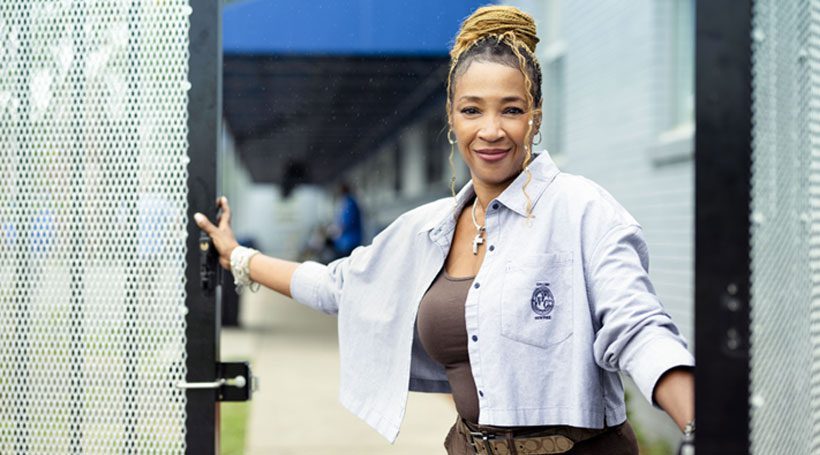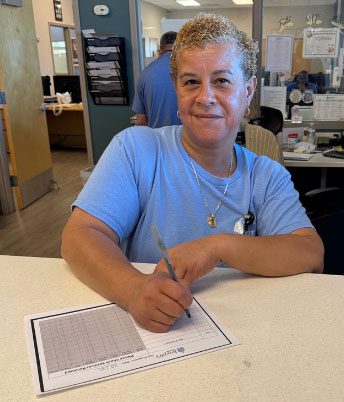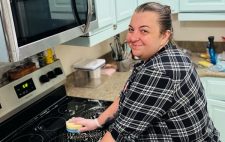PHOTO BY DAVID MICHAEL HOWARTH
On one of the hottest afternoons two summers ago, Colandra Coleman stepped outside Joseph’s House of Camden. New to her role as the shelter’s executive director, she noticed familiar faces gathered at the locked gate, waiting for the doors to reopen at 8 pm.
She knew it was a bad setup: People outside had nowhere safe to escape the heat, and they were at risk of getting a ticket for loitering. She reminded them they couldn’t stay.
“One of the guests said to me, in the most honest voice he could, ‘Where do you want us to go?’” Coleman says.
The question hit her hard because there was no good answer.
“They honestly had no place to go, and it was almost taking us backwards,” she says. “When folks left the facility, it was as if we were sending them right back into the dysfunctional behaviors that led them to become homeless in the first place – whether it was drugs, crime, whatever the case may be.”
Coleman brought that conviction to her board of directors. They had talked about expanding hours for years, but this moment made it urgent. She asked them to take a leap of faith – to open around the clock even without new funding in place. It would mean creating a third staff shift and building new programming to fill those hours, with no clear way to cover the cost.
“We just said, we’ll figure out the money part as we go,” Coleman says. “We knew the need was too great to wait.”
In April, the shelter piloted a 24/7 schedule. By May 1, the change was official. With longer hours came the chance to do more, including adding an afternoon social worker and a service delivery manager to build out programming that would help more people move toward stability.
“Before, people were just waiting around until they could get back inside,” says Coleman. “Now we have group sessions that help folks build the skills they need to succeed on their own.”
Guests, as they are called, can attend Alcoholics Anonymous meetings on site. They can join financial literacy classes, meditation groups and even workshops on basic hygiene or interview etiquette.
“These may sound like small things,” she says, “but they’re the things that make the difference between someone staying stuck and someone moving forward.”
On any given night, about 80 people sleep under St. Joseph’s roof, sometimes closer to 90. And the reach extends beyond those nightly residents. More than 100 bag lunches go out daily, and people who don’t sleep there can still come for showers, laundry and other support, Coleman says.
It’s an ambitious direction, but one that reflects the spirit in which Joseph’s House was created in 2010. Founded by the late Father Bob McDermott and other Camden advocates, the nonprofit was to create a place of hospitality, where people with nowhere else to turn could find food, rest and dignity.
It remains the city’s only low-barrier shelter, meaning it opens its doors to people other shelters often turn away – those still battling addiction, living with untreated mental illness or simply knocked down by bad luck.
“These are the most vulnerable people on the streets,” Coleman says. “They’re the ones who most need a safe place. Other shelters may turn them away, but we can’t.”
Taking the shelter fully 24/7 has required that same spirit of faith and community support, says Coleman, who launched a campaign to help cover the added costs. So far it has raised more than $640,000 from private donors, foundations and local partners. One of the most significant boosts – $100,000 – came from Impact100 South Jersey, a women’s giving collective and first-time donor to the nonprofit, which operates on a $2.5 million annual budget.
“The leap of faith was worth it,” says Coleman, though she notes that long-term stability is still uncertain. Federal HUD funding for shelters is being cut back, and those reductions are already trickling down to local providers, she says.
“These cuts are happening at the very time people need us most,” she says. “That’s scary. But we also know people see the need, and they don’t want to see us go away.”
For Coleman, leading Joseph’s House fulfills a vision she’s carried since college. As a student at George Washington University, she often passed the tents of homeless veterans near the reflecting pond. “I said to myself, these are people who served our country and fought for our freedom. How can they be living like this?”
Still, she didn’t pursue that path until later in life. “When I turned 50, I decided I would go for it,” she says. She went on to lead shelters in Maryland and Philadelphia before coming to Camden in 2023.
“This is the most rewarding job I’ve ever had,” Coleman says. “It also takes the most work. But when you see someone who thought of themselves as a throwaway finally get the chance to start over – there’s nothing like it.”
From Seeking Shelter to Providing It
When Brenda Colon came to Joseph’s House seven years ago, she had nowhere else to turn. A volatile relationship, health problems and a shady landlord had left her suddenly homeless. She spent a long weekend in the streets: lining up at Cathedral Kitchen for food, sleeping outside near the old Camden library and even in front of the prison, because she felt safer where guards were posted.
“It was very scary out there,” Colon says.
She ended up at Joseph’s House, where she was directed to a staffer named Radio, who himself had once been homeless. “He told me, ‘Put your head up. You’re worth something. Today is a new beginning for you,’” she says. “That first night I slept here was the most peaceful night I’d had in years.”
With help from case managers, Colon eventually found work at Amazon, saving nearly every paycheck. Because Joseph’s House provided meals, toiletries and laundry, she was able to move into her own place within 2 months of starting the job. When Covid hit, she was laid off, and soon arrived back at the shelter.
At first, she says, returning felt like a failure. But with support from staff, she began volunteering around the shelter: pitching in wherever she could. In 2020, she joined the staff, first as a greeter, then she trained for management. Today, she is often the first face guests see when they arrive.
“I tell people the same thing Radio once told me: ‘You have value, you can start again,” Colon says. “People know when you’re speaking from the heart. That’s what sticks.”















